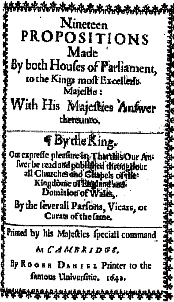
On 1 June 1642[1] the English Lords and Commons approved a list of proposals known as the Nineteen Propositions, sent to King Charles I of England, who was in York at the time.[2] In these demands, the Long Parliament sought a larger share of power in the governance of the kingdom. Among the MPs' proposals was Parliamentary supervision of foreign policy and responsibility for the command of the militia, the non-professional body of the army, as well as making the King's ministers accountable to Parliament.[3][4] Before the end of the month the King rejected the Propositions and in August the country descended into civil war.
- ^ The Parliamentary or Constitutional History of England, Vol. XI. London: William Sandry. 1753. pp. 129–135. Retrieved 28 August 2018.
- ^ Parliament approved the Propositions on June 1, but the text that was sent is dated June 3.
- ^ Plant, David The Nineteen Propositions
- ^ British Civil Wars & Commonwealth website Retrieved 3 March 2010